#android app development using react native
Explore tagged Tumblr posts
Text
How to Build Software Projects for Beginners

Building software projects is one of the best ways to learn programming and gain practical experience. Whether you want to enhance your resume or simply enjoy coding, starting your own project can be incredibly rewarding. Here’s a step-by-step guide to help you get started.
1. Choose Your Project Idea
Select a project that interests you and is appropriate for your skill level. Here are some ideas:
To-do list application
Personal blog or portfolio website
Weather app using a public API
Simple game (like Tic-Tac-Toe)
2. Define the Scope
Outline what features you want in your project. Start small and focus on the minimum viable product (MVP) — the simplest version of your idea that is still functional. You can always add more features later!
3. Choose the Right Tools and Technologies
Based on your project, choose the appropriate programming languages, frameworks, and tools:
Web Development: HTML, CSS, JavaScript, React, or Django
Mobile Development: Flutter, React Native, or native languages (Java/Kotlin for Android, Swift for iOS)
Game Development: Unity (C#), Godot (GDScript), or Pygame (Python)
4. Set Up Your Development Environment
Install the necessary software and tools:
Code editor (e.g., Visual Studio Code, Atom, or Sublime Text)
Version control (e.g., Git and GitHub for collaboration and backup)
Frameworks and libraries (install via package managers like npm, pip, or gems)
5. Break Down the Project into Tasks
Divide your project into smaller, manageable tasks. Create a to-do list or use project management tools like Trello or Asana to keep track of your progress.
6. Start Coding!
Begin with the core functionality of your project. Don’t worry about perfection at this stage. Focus on getting your code to work, and remember to:
Write clean, readable code
Test your code frequently
Commit your changes regularly using Git
7. Test and Debug
Once you have a working version, thoroughly test it. Look for bugs and fix any issues you encounter. Testing ensures your software functions correctly and provides a better user experience.
8. Seek Feedback
Share your project with friends, family, or online communities. Feedback can provide valuable insights and suggestions for improvement. Consider platforms like GitHub to showcase your work and get input from other developers.
9. Iterate and Improve
Based on feedback, make improvements and add new features. Software development is an iterative process, so don’t hesitate to refine your project continuously.
10. Document Your Work
Write documentation for your project. Include instructions on how to set it up, use it, and contribute. Good documentation helps others understand your project and can attract potential collaborators.
Conclusion
Building software projects is a fantastic way to learn and grow as a developer. Follow these steps, stay persistent, and enjoy the process. Remember, every project is a learning experience that will enhance your skills and confidence!
3 notes
·
View notes
Text
Hire a Mobile App Development Company in India Today
Looking for high-quality mobile app development at affordable prices? You’ve come to the right place. At Mobulous Technologies, we help startups, enterprises, and entrepreneurs turn their app ideas into stunning reality.
Why Choose India for Mobile App Development?
Access to the best Indian app developers for hire
Cost-effective pricing without compromising on quality
Skilled teams in Flutter app development, React Native, Android, and iOS
Seamless communication and project management
End-to-end solutions: UI/UX mobile app design to deployment
What We Offer
Custom Mobile App Development India
Cross-Platform App Development (Flutter, React Native)
On-Demand Mobile Apps
Android and iOS App Development Company India
Full-stack App Development Services India
Technologies We Work With
We combine the latest technologies to build modern, user-centric mobile application solutions:
Flutter App Development
React Native Developers
Swift, Kotlin, Node.js, Firebase
Figma, Adobe XD for UI/UX
AI, Blockchain, IoT, AR/VR integrations
Why Hire Us?
Recognized among the top mobile app development companies India
500+ apps delivered across industries
ISO certified process, 100% NDA-secure
Dedicated project manager & on-time delivery
Trusted by global brands and startups alike
Affordable Mobile App Development in India
We offer flexible engagement models to suit all business sizes. Whether you’re building an MVP or a fully customized solution, our pricing fits your budget.
App Type with Estimated Cost (USD)
Basic App: $5,000 – $10,000
Mid-Level App: $10,000 – $30,000
High-End Custom App: $30,000+
How to Get Started
Step 1: Share your idea with us
Step 2: Get a detailed proposal with timeline and cost
Step 3: We build your app with frequent updates
Step 4: Launch your product and scale your business
Let’s Build Your App Together
Ready to build your dream app with the help of top-tier mobile app developers in India? Let Mobulous Technologies help you every step of the way.
Also Read This: https://sites.google.com/view/hiremobileappdevelope/10-reasons-you-should-hire-a-mobile-app-development-company-in-india-today
#mobile app development services in India#custom app development India#mobile app developers India#affordable app development India#Android app development#iOS app development#app development outsourcing#app development team India
2 notes
·
View notes
Text
Best React Native App Developers in Indore for Android & iOS Solutions
Looking for top React Native app developers in Indore to build high-quality mobile applications? Young Decade is your trusted partner for developing scalable, feature-rich, and high-performance Android & iOS solutions. With our expertise in React Native development, we create apps that offer a seamless user experience across both platforms while ensuring cost-effective development.

Why Choose Young Decade for React Native App Development?
✅ Cross-Platform Excellence – Develop once, run on both Android and iOS without compromising performance. ✅ Custom Mobile Solutions – We tailor apps to meet your specific business needs. ✅ Fast Development & Deployment – Reduce time-to-market with efficient coding and reusable components. ✅ Engaging UI/UX – Deliver visually stunning and interactive mobile experiences. ✅ Performance-Optimized Apps – Build applications that load fast and run smoothly.
At Young Decade, we focus on building secure, scalable, and business-driven mobile applications. Whether you need a startup MVP, an enterprise solution, or an eCommerce app, our expert React Native developers in Indore ensure cutting-edge development with the latest technologies.
Start Your React Native Project Today!
Partner with Young Decade for the best React Native app development services in Indore. Let’s build a powerful and efficient Android & iOS app that helps your business grow. Contact us now to get started! 🚀
#software development company#android app developers#app development company#best android app development company#software development#flutter app development company in Indore#react native app development company in indore#mobile app development company in Indore
2 notes
·
View notes
Text

Navigating the Complex World of Mobile App Development
In today’s tech-driven world, mobile apps have become a cornerstone of how we connect, work, and play. Whether you’re launching a startup or enhancing an established business, building a mobile app can be a game-changing move. One of the most important decisions you’ll face is choosing the right technology stack. The tech stack you pick will directly influence your app’s performance, scalability, and overall user experience.
What Exactly Is a Tech Stack?
A tech stack is essentially the set of tools, programming languages, and frameworks you use to build your app. For mobile apps, the stack typically consists of three main components:
Front-End: This is what users see and interact with — the app’s interface.
Back-End: This is the engine under the hood — handling data storage, processing, and integrations.
Platform: The operating system your app is built for, like iOS, Android, or both.
Key Considerations When Picking a Tech Stack
Let’s dive into the options and what you should think about when deciding which tools to use.
Platform Options
Native Development
Languages:
iOS: Swift or Objective-C
Android: Kotlin or Java
Pros:
Best-in-class performance.
Full access to device features like cameras, sensors, and GPS.
Cons:
Higher costs.
Longer development time if building for both iOS and Android.
2. Cross-Platform Development
Frameworks:
React Native (JavaScript and React)
Flutter (Dart)
Xamarin (C#)
Pros:
Faster development.
Reusable code for both iOS and Android.
Generally lower costs.
Cons:
Slightly lower performance compared to native apps.
Limited access to some advanced native features.
3. Hybrid Development
Tools:
Ionic (HTML, CSS, JavaScript)
PhoneGap/Cordova (HTML, CSS, JavaScript)
Pros:
Easy to learn and work with if you’re familiar with web development.
Leverages standard web technologies.
Cons:
Performance is not as strong as native or well-optimized cross-platform apps.
User experience can feel less “native.”
How to Make the Best Choice for Your App
Your decision will depend on several factors. Here are some key points to consider:
App Complexity:
For simple apps, cross-platform frameworks like React Native or Flutter are great choices.
For feature-heavy or complex apps, native development might be the way to go.
Time to Market:
If you’re on a tight schedule, cross-platform tools can speed up the process.
Budget:
Native development can be pricey since you’ll likely need separate teams for iOS and Android.
Cross-platform and hybrid options are usually more cost-effective.
Performance Needs:
Native apps deliver the best performance, but modern cross-platform frameworks have come a long way and can handle most needs efficiently.
Team Expertise:
Leverage the skills your team already has. If they’re experienced in JavaScript, for example, React Native might be a natural fit.
Final Thoughts
Choosing the right tech stack is a pivotal step in mobile app development. It’s about finding the perfect balance between your project’s requirements, your budget, and your team’s expertise. By weighing factors like app complexity, performance, and cost, you can make a well-informed choice that sets your app up for success. Remember, a solid tech stack is the foundation of a scalable, user-friendly, and high-quality app.
#mobile app development#android development#ios development#hybrid app development#cross platform app development#technology#software development#programming
2 notes
·
View notes
Text
Cross-Platform App Development Services: Breaking Barriers and Expanding Reach

In today's digital era, mobile applications have become an integral part of our lives. Whether it's for social networking, e-commerce, or productivity, mobile apps have revolutionized the way we interact with technology. However, developing an app that can cater to the diverse needs of users across different platforms can be a daunting task for businesses. This is where cross-platform app development services come into play.
What is Cross-Platform App Development?
Cross-platform app development is the process of building mobile applications that can run on multiple operating systems, such as iOS and Android, using a single codebase. Unlike native app development, which requires separate codebases for each platform, cross-platform development allows businesses to save time, resources, and effort by creating a single app that works across various platforms.
The Advantages of Cross-Platform App Development:
1. Cost-Effectiveness: Developing separate apps for different platforms can be expensive. Cross-platform development enables businesses to significantly reduce costs by reusing a single codebase across multiple platforms. This approach also minimizes the need for hiring platform-specific developers, resulting in further cost savings.
2. Time Efficiency: Cross-platform frameworks and tools provide developers with the ability to write code once and deploy it on multiple platforms. This drastically reduces the time required for development, testing, and deployment, allowing businesses to bring their apps to market faster and gain a competitive edge.
3. Consistent User Experience: With cross-platform development, businesses can ensure a consistent user experience across different platforms. By using a single codebase, developers can maintain design and functionality consistency, resulting in a seamless experience for users, regardless of the device or operating system they use.
4. Wider Market Reach: By developing a cross-platform app, businesses can reach a broader audience as their application can run on various devices and operating systems. This expanded market reach enhances brand visibility and increases the potential user base, leading to greater customer acquisition and revenue generation.
5. Easy Maintenance: Updating and maintaining separate codebases for different platforms can be challenging. Cross-platform development simplifies the maintenance process as changes and updates can be applied to a single codebase, ensuring consistency and reducing the chances of introducing bugs or inconsistencies across platforms.
Choosing the Right Cross-Platform Development Framework:
When it comes to cross-platform app development, there are several frameworks available, each with its unique features and capabilities. The choice of framework depends on various factors such as project requirements, target audience, performance needs, and developer expertise. Some popular cross-platform frameworks include React Native, Flutter, Xamarin, and Ionic.
Partnering with Cross-Platform App Development Services:
While cross-platform app development offers numerous benefits, it requires technical expertise and experience to leverage the full potential of these frameworks. This is where partnering with cross-platform app development services can make a significant difference.
Professional app development services specializing in cross-platform development have the necessary skills, knowledge, and resources to create high-quality, feature-rich applications that can run seamlessly across multiple platforms. These services understand the intricacies of various frameworks, ensuring optimal performance and user experience.
Additionally, cross-platform app development services keep up with the latest industry trends and advancements, allowing businesses to incorporate cutting-edge features and technologies into their applications. They also provide ongoing support, maintenance, and updates, ensuring that the app remains up-to-date and compatible with the latest devices and operating system versions.
Conclusion:
Cross-platform app development services have emerged as a game-changer for businesses looking to develop mobile applications that can reach a wider audience while optimizing costs and development time. By leveraging the benefits of cross-platform development, businesses can break barriers, expand their reach, and deliver engaging experiences to users across multiple platforms.
Whether you are a startup or an established enterprise, partnering with cross-platform app development services can unlock new opportunities and drive your business forward in the ever-evolving mobile landscape.
Source
#AppDevelopment#WebDevelopment#MobileApps#WebApps#SoftwareDevelopment#UIUXDesign#MobileDevelopment#WebDesign#CodeLife#TechSolutions#AppDesign#MobileTech#WebDev#DigitalTransformation#ResponsiveDesign#Innovation#TechIndustry#AppSolutions#WebSolutions#CodeNerds
23 notes
·
View notes
Text
Transforming Businesses with DI Solutions: Innovative IT Expertise
Transform your business with DI Solutions

In the ever-evolving digital landscape, businesses must harness cutting-edge technology to remain competitive. At DI Solutions, we specialize in driving business transformation through advanced IT solutions and expert services. Our dedication to innovation and excellence has empowered numerous clients to achieve their goals and excel in their industries.
Innovative IT Solutions DI Solutions excels in providing tailored IT solutions that meet each client's unique needs. Our services include custom software development, mobile app creation, web development, and UI/UX design. By leveraging the latest technologies, we deliver state-of-the-art solutions that enhance growth and efficiency.
Expert Team of Professionals Our team consists of highly skilled professionals—creative designers, experienced developers, and strategic problem-solvers. We emphasize continuous learning to stay at the forefront of industry trends and technological advancements, ensuring that our clients receive the most effective and innovative solutions.
Global Reach and Impact
With over a decade of experience, DI Solutions has made a significant impact globally, partnering with more than 120 clients across North America, Europe, Asia, and Australia. Our extensive global presence demonstrates our capability to provide exceptional IT services that address diverse business needs.
Client-Centric Approach
At DI Solutions, clients are central to our mission. We take the time to understand their business objectives, challenges, and requirements, enabling us to deliver customized solutions that surpass expectations. Our client-centric approach ensures we provide not just what is needed but what drives success and growth.
Comprehensive IT Services
Our service offerings include:
Custom Software Development: Tailored software solutions for optimal efficiency and performance.
Mobile App Development: Innovative mobile applications for Android and iOS platforms.
Web Development: Expert web development to create responsive and user-friendly websites.
UI/UX Design: Engaging user interfaces that enhance the overall user experience.
Quality Assurance: Rigorous testing to ensure the highest quality standards.
DevOps Services: Streamlined operations through integrated cultural philosophies, practices, and tools.

Join Hands with DI Solutions
Partner with DI Solutions to harness the power of innovative IT expertise. Whether you’re a startup aiming to establish a presence or an established business seeking new heights, we have the solutions and expertise to propel you forward.
For more information, visit our website or contact us directly. Let’s embark on a journey of transformation and growth together.
Transform your business with DI Solutions – where innovation meets excellence.
Contact Us Website: https://disolutions.net/ Email: [email protected] , Call: 91-9904566590 , B-301, 307, 406 Apex Commercial Center, Varachha Road, Nr. Yash Plaza, Surat, Gujarat,India-395006.
youtube
#disolutions #DI Solutions #Hire Angular.js Developers #Hire React.js Developers #Hire Vue.js Developers #Hire UI/UX Developers #Hire .NET Developers #Hire Node.js Developers #Hire Laravel/PHP Developers #Hire Android Developers #Hire IOS Developers #Hire Ionic Developers #Hire React Native Developers #Hire Full Stack Developers #Hire MERN Stack Developers #Hire MEAN Stack Developers #Mobile App Development #Web Development #UI/UX Design #Quality Assurance #DevOps Services
2 notes
·
View notes
Text
Top Mobile App Development Frameworks in 2023 - Lode Emmanuel Palle
As of my last knowledge update in September 2021, I can provide information about some of the popular mobile app development frameworks up to that point. However, please note that the landscape of technology can change rapidly, and new frameworks may have emerged or gained popularity since then. Here are some of the well-known mobile app development frameworks mentioned by Lode Emmanuel Palle that were popular up to 2021:
React Native: Developed by Facebook, React Native is a widely used open-source framework for building cross-platform mobile apps. It allows developers to use JavaScript to create native-like user interfaces for both iOS and Android.
Flutter: Created by Google, Flutter is another popular open-source framework for building cross-platform apps. It uses the Dart programming language and provides a rich set of customizable widgets, enabling high-quality and performant user interfaces.
Xamarin: Owned by Microsoft, Xamarin allows developers to build native apps for iOS, Android, and Windows using a single codebase in C#. It provides a way to share a significant portion of code across platforms while still delivering native user experiences.
Ionic: Built on top of Angular and using web technologies like HTML, CSS, and JavaScript/TypeScript, Ionic is a framework for building cross-platform mobile apps with a native-like feel. It also provides a suite of UI components.
Vue Native: Based on Vue.js, Vue Native lets developers build mobile apps using Vue's declarative syntax. It's designed to be similar to React Native, making it easy for developers familiar with Vue.js to transition to mobile development.
PhoneGap / Apache Cordova: PhoneGap is an open-source framework that uses web technologies to build mobile apps that can run on various platforms. It leverages Apache Cordova to access native device features.
SwiftUI (for iOS): Introduced by Apple, SwiftUI is a framework for building user interfaces across all Apple platforms using Swift programming language. It's mainly focused on iOS, macOS, watchOS, and tvOS app development.
Kotlin Multiplatform Mobile (KMM): Developed by JetBrains, KMM is a relatively new framework that aims to allow developers to share code between Android and iOS apps using Kotlin. It's designed for more seamless cross-platform development.
NativeScript: NativeScript enables building native apps using JavaScript, TypeScript, or Angular. It provides access to native APIs and components, offering a truly native experience.
According to Lode Emmanuel Palle. the choice of a mobile app development framework depends on various factors including your familiarity with the programming language, the complexity of the app, the desired platform(s), and the specific features you need. It's always a good idea to research and stay updated on the latest developments in the field to make informed decisions.
9 notes
·
View notes
Text
Exploring the Difference Between Web Development and App Development
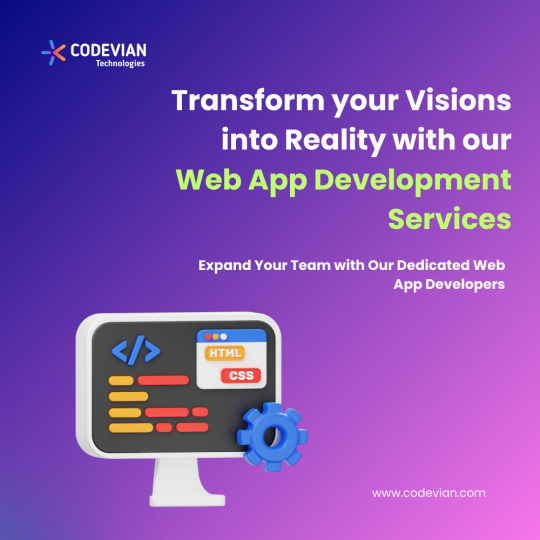
Hey there, tech enthusiasts! So, you've heard about web development and app development, but you're not quite sure what sets them apart? Don't worry, I'll break it down for you in simple terms!
First things first, what exactly is web development? Well, think of it like building a house on the internet! Web development involves creating websites or web applications that can be accessed through a web browser, like Google Chrome or Safari. It's all about designing, building, and maintaining websites that people can visit and interact with online.
Now, let's talk about app development. This is like building a cozy little home on your smartphone or tablet! App development involves creating mobile applications that are installed directly onto your device, like games, social media apps, or productivity tools. It's all about designing, building, and maintaining applications that people can download and use on their mobile devices.
So, what's the difference between web development and app development? Here are a few key distinctions:
Platform: The biggest difference between web development and app development is the platform they're built for. Web app development services focuses on creating websites or web applications that are accessed through a web browser on desktop computers or mobile devices. App development, on the other hand, focuses on creating mobile applications that are installed directly onto a device and accessed through an icon on the home screen.
Technology: Web development typically involves technologies like HTML, CSS, and JavaScript for creating the front end (what users see and interact with) and languages like PHP, Python, or Node.js for creating the back end (the server-side logic). App development, on the other hand, often involves languages like Java or Kotlin for Android development, Swift or Objective-C for iOS development, or frameworks like React Native or Flutter for cross-platform development.
Distribution: Web applications are usually accessible to anyone with an internet connection and can be accessed through a web browser without the need for installation. Mobile applications, on the other hand, need to be downloaded and installed onto a device from an app store like the Apple App Store or Google Play Store.
User Experience: The user experience of web applications and mobile applications can be quite different. Web applications are designed to work across different devices and screen sizes, so they often have a responsive design that adapts to fit the user's device. Mobile applications, on the other hand, are specifically designed for use on mobile devices and can take advantage of features like touch screens, GPS, and push notifications.
In conclusion, while web development and app development share some similarities, such as creating digital experiences for users, they also have key differences in terms of platform, technology, distribution, and user experience. Whether you're interested in building websites or mobile applications, both fields offer exciting opportunities to unleash your creativity and make an impact in the digital world!
2 notes
·
View notes
Text
Cross-Platform App Development In Dubai - An Insightful Guide To Follow
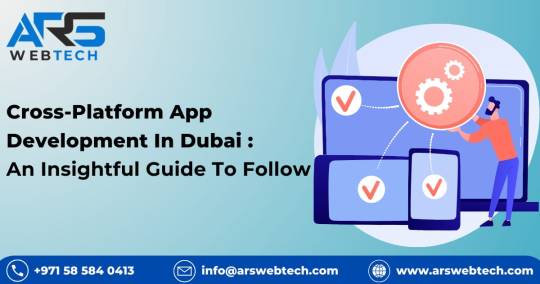
In the heart of the United Arab Emirates, the dynamic world of mobile app development is evolving rapidly, and Dubai is at its forefront. This guide delves into the world of cross-platform app development, highlighting its essentials and showcasing leading mobile app development firms in the UAE, like ARS Webtech.
An Insightful Overview About Cross-Platform App Development
Cross-platform app development involves creating mobile applications that run on multiple platforms using a single codebase. This approach contrasts with traditional native app development, which requires writing separate code for each platform, such as Java or Kotlin for Android and Swift or Objective-C for iOS.
Benefits of Cross-Platform App Development By Mobile App Development Companies UAE
Code Reusability: Developers can write and manage code that works across various platforms, reducing development time and effort.
Cost and Time Efficiency: Faster and more economical than developing individual native apps, it simplifies the entire development cycle.
Wider Market Reach: A single app can target different platforms, expanding market reach.
Consistent User Experience: Cross-platform frameworks support maintaining a consistent experience across platforms.
Faster Deployment and Updates: Facilitates simultaneous feature release across all platforms.
Popular Cross-Platform Development Frameworks
Flutter: Known for creating visually appealing apps, it's a strong choice for businesses in Dubai.
React Native: Supported by Facebook, it allows developers to build mobile apps using React and JavaScript, known for its flexibility and seamless integration.
Best Practices In Cross-Platform App Development
Prioritize User Experience: Ensuring apps function flawlessly with an intuitive interface is crucial.
Security Considerations: Especially important in sectors like healthcare and e-commerce, robust security measures are essential.
Scalability: The app should accommodate increased user traffic and additional features as the business grows.
Regular Updates and Maintenance: Ensuring the app remains compatible with the latest operating systems and user expectations.
Integration of Emerging Technologies: Incorporating AI, IoT, 5G connectivity, and machine learning enhances user experiences and contributes to Dubai's smart city initiatives.
Blockchain for Increased Security: Integrating blockchain technologies can add an extra layer of security, particularly in sensitive industries.
Conclusion
Cross-platform app development is a strategic choice for businesses in Dubai looking to maximize their digital presence. Companies like ARS Webtech are at the forefront of this movement, driving innovation and excellence in the mobile app development scene.
FAQs
1. Which frameworks are commonly used for cross-platform app development in Dubai?
Flutter and React Native are two prominent frameworks. Flutter is known for its visually stunning apps, while React Native offers flexibility and seamless integration.
2. How do mobile app development companies in Dubai prioritize user experience in cross-platform apps?
User experience is a top priority, ensuring consistent and delightful interfaces across devices.
3. How to choose between Flutter and React Native?
The choice depends on specific project requirements, design preferences, development speed, and existing tech stacks.
For further guidance or to start your cross-platform app development journey, contact ARS Webtech at +971585840413.
#ios app development#mobile app company#mobile app developer company#android#digital marketing#mobile app#digital marketing agency#digital marketing company#digital marketing strategy#digital marketing services
2 notes
·
View notes
Text
Services for Developing Mobile Apps in Gurgaon: Rajmith
Rajmith is a leading provider of mobile app development services in Gurgaon. With a team of skilled developers and a track record of successful projects, we offer a range of services to bring your mobile app ideas to life. Our services include:

iOS App Development: We specialize in developing feature-rich iOS apps that cater to the unique needs of Apple users. From concept to deployment on the App Store, we handle it all.
Android App Development: Our Android app development services cover a wide range of categories, from business and e-commerce to gaming and utility apps.
Cross-Platform App Development: We use cutting-edge technologies like React Native and Flutter to build cross-platform apps that work seamlessly on both iOS and Android devices, saving you time and resources.
UI/UX Design: Our team of designers creates stunning and user-friendly interfaces that enhance the overall user experience of your mobile app.
Custom App Development: We understand that each business is unique. Our custom app development services ensure that your app is tailored to your specific requirements and objectives.
App Maintenance and Support: We offer post-launch support and maintenance services to keep your app running smoothly and up to date with the latest OS versions and security patches.
Mobile App Testing: Rigorous testing ensures the quality and reliability of your app. Our testing processes cover functionality, performance, security, and usability.
App Consultation: If you're unsure about your app idea's technical aspects or feasibility, our experts can provide valuable consultation to guide you in the right direction.
App Marketing Services: We can assist you in marketing your mobile app to reach your target audience effectively and maximize its visibility in the app stores.
Emerging Technologies: We stay updated with the latest trends and technologies in mobile app development, including AI, AR, VR, and blockchain, to offer innovative solutions.
At Rajmith, we are committed to delivering high-quality mobile app solutions that meet your business objectives. Contact us today to discuss your project and take the first step toward bringing your mobile app vision to reality.
#app development company#mobile app development company in gurgaon#mobile app development company#mobile app development
3 notes
·
View notes
Text
App Development frameworks
How do the most popular app development frameworks contribute to mobile app development?
In today’s digital landscape, mobile applications (app development frameworks) have become a necessity for businesses to reach their target audience effectively. With the ever-growing demand for innovative and user-friendly mobile applications, developers are constantly seeking efficient ways to build high-quality applications in very little time. This is where mobile app development frameworks come into play. The frameworks provide a foundation for developers to create cross-platform mobile applications that work seamlessly across various devices and OSes.
Development Frameworks Used for Developing Mobile Applications
Most popular app development frameworks
React Native (developed by Facebook) — This framework has gained immense popularity among developers due to its ability to build native-like mobile apps using JavaScript. It allows them to write the codes once and deploy them on both Android and iOS platforms. Hire React Native developers to obtain cross-platform mobile app solutions for iOS, Android, and the web and enjoy benefits like reduced costs and time and enhanced productivity and profitability. app development frameworks
Flutter (backed by Google) — Flutter uses the Dart programming language and provides a rich set of customizable widgets, enabling developers to create visually appealing and responsive applications. Its hot reload feature helps the developers change the codes in real time and obtain immediate visual updates. If you opt to hire Flutter developers, your cross-platform applications will have a quicker time-to-market with a single codebase for all the platforms. app development frameworks
Ionic (open-source framework) — It uses technologies like HTML, CSS, and JavaScript in the development of cross-platform mobile applications. It enables developers to provide end users with a consistent user experience across multiple platforms. It will be a smart choice to hire Ionic developers when it comes to obtaining a feature-rich cross-platform mobile application. app development frameworks
Kotlin (open source, originated at JetBrains) — This is another app development framework that allows developers to share codes between Android and iOS platforms. It seamlessly works with Android Jetpacks (a tool provided by Google). Hire Kotlin developers to enjoy improved app performance and a better user experience with access to modern technologies. app development frameworks
Hire Experts
In today’s mobile-driven world, mobile app development has become a crucial aspect of achieving business success. Hiring the right mobile app developer is essential to obtaining a high-quality application. With various frameworks available, such as React Native, Flutter, Ionic, and Kotlin, selecting the ideal developer can be challenging. A skilled developer can help you cut down on the cost of application development. Correspondingly, it will lead to an increase in the ROI value. Hire the best developers from WEBSTEP Technologies. Visit https://www.webstep.in to obtain more information and connect with them to acquire a cutting-edge mobile solution for your business. app development frameworks
2 notes
·
View notes
Text
React Native: Why Should You Use It For Your Mobile App?
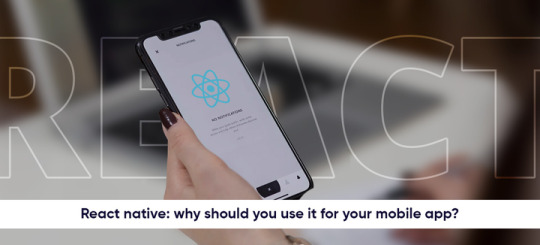
Introduction
There is no doubt that mobile applications are a basic need in our day-to-day life. Tons of mobile apps are being downloaded every day. Every organization requires a mobile application for its business so every app must be well-optimizer and user-friendly as well.
Therefore various frameworks are being created and used to give out the best mobile app to the customer and from all of them react native is one of them.
What is React Native?
With various frameworks and technologies available, choosing the right one can be terrible. However, when it comes to creating high-quality mobile apps, React Native has always been a first thought for mobile app developers.
In simple words, React Native is an open-source UI software Framework for creating mobile applications for Android and iOS platforms. Moreover, it allows developers to build high-quality mobile applications using a single codebase.
However, the question arises as to why React Native is the best framework for mobile applications. So, let’s begin with why mobile app developers rely more on the React Native framework.
The Advantages of React Native
The apps that are created by React Native are always of high quality and flexible towards code sharing to make it a developer-friendly framework.
Cross-Platform Compatibility One of the most significant advantages of React Native is that it’s flexible on various platforms. As it’s a cross-platform framework it provides the same level of performance as a native app for android and iOS as well. It just requires a base code and it can be operated on any OS platform, by which you don't have to hire developers for various platforms. That’s the reason why React Native is used as a hybrid application.
UI Focused React Native allows you to create a unique eye-catching UI (User-Interface) for the app. It involves components like clicks, hovers, keyboard inputs, and all to make your mobile user-friendly and easy to navigate. You can say this framework pays a lot of attention to designing UI apps.
Hot Reloading This is one of the advantages that allows the developers to view two screens at a time allowing them to inspect the live changes without reloading the entire app. Hot reloading is also known as Live reloading which improves the development process with real-time feedback.
Better Performance Compared to native apps React has plenty of components that are used for different features and functions. Therefore, it allows the developer to create mobile apps faster and more efficiently which reduces the time and work needed to develop an app.
Accessibility For every mobile app development process accessibility is the main aspect as it increases the size of your potential market. React Native has a considerably more robust accessibility API than many others. Developers can gain benefits in approving apps from this feature of React Native.
Future Of React Native
React Native has already made a name for itself in the field of developing mobile applications. Performance and stability optimization will be one of React Native's main future priorities.
To provide a seamless experience for developers and end users, the React Native team and the community are actively solving the performance issues. The bridge between JavaScript and native components is being optimised to cut down on cost and speed up rendering.
This involves enhancing navigational capabilities, enabling smoother animations, and improving support for platform-specific components.
The future possibilities for React Native are promising to continue work and a passionate user base. The developer experience is streamlined and native-like user interfaces are made possible as performance increases.
Conclusion
In conclusion, React Native is the clear choice for mobile app development. Its numerous advantages, cost-effectiveness, and ability to deliver native-like experiences making it the preferred framework for developers worldwide.
So, embrace your React Native mobile application with Techvoot Solutions where our experts ensure to create a seamless and robust mobile application for your organisation.
Frequently Asked Questions
Is React Native the same as React? Yes, React Native shares some concepts with React, they are not the same. React Native is specifically designed for mobile app development, whereas React is a JavaScript library for building web user interfaces.
Can I use existing web development skills with React Native? Yes, if you have experience with JavaScript and React, you’ll find it easy to get started with React Native.
Which Programming languages are used in React Native? React Native primarily uses JavaScript or TypeScript for building mobile applications. It allows the writing of platform-specific code using iOS and Java when necessary.
Can I use native modules with React Native? Yes, React Native allows the integration of native modules written in Swift, Objective-C, Java, or other native languages.
Can I use third-party libraries and plugins with React Native? Yes, React native community offers a wealth of third-party resources to enhance your app’s functionality. Source:
3 notes
·
View notes
Text
Best Affordable Mobile App Development Solutions in Indore, India – Young Decade
Looking for affordable mobile app development solutions in Indore, India? Young Decade is your go-to company for high-quality, budget-friendly app development. We specialize in creating custom Android and iOS applications that help businesses grow without exceeding their budget.
Why Choose Young Decade?
✅ Cost-Effective Solutions – High-performance apps at the best prices. ✅ Custom Mobile Apps – Tailored solutions to meet your business goals. ✅ Android & iOS Development – Native and cross-platform app expertise. ✅ Scalable & Secure Apps – Future-ready applications for long-term success. ✅ On-Time Delivery – Fast, efficient, and reliable app development.
At Young Decade, we focus on creating user-friendly, feature-rich, and scalable apps for startups, enterprises, and small businesses. Our experienced developers use the latest React Native, Flutter, and Native Development technologies to deliver powerful mobile solutions.
Let’s Build Your App Today!
If you need affordable mobile app development in Indore, India, Young Decade is here to help. Get in touch with us and turn your ideas into a high-quality mobile app at the best price!
#app development company#best android app development company#software development company#android app developers#developers & startups#software development#Top mobile app development company in Indore#flutter app development company in Indore
2 notes
·
View notes
Text
What is the Best Mobile Application Development Framework, Flutter, or React Native?

As an ever-increasing number of individuals are accepting modernized innovation in technology, the interest in mobile applications has expanded step by step.
Hybrid mobile frameworks are acquiring prevalence. The presence of React Native (RN) in 2015 opened astounding chances to assemble applications for iOS and Android utilizing one codebase. Thus, it permitted us to solve two problems at once and not rework a similar code two times. Large firms like UberEats, Discord, and Facebook moved to React Native, a powerful promotion.
Google didn’t stand separated; they saw the immense popularity of RN. Subsequently, Google presented an alpha version of its hybrid framework called Flutter in 2017. Flutter likewise turned into an extremely famous framework. The improvement of a framework like React Native prompts confusion over what to decide for hybrid mobile app development:
React Native or Flutter? Nonetheless, there’s another significant inquiry which you ought to choose before this: Is it better to develop a hybrid or native mobile apps?
Both cross- platform application has its upsides and downsides and prevalence
Flutter
Flutter is an open-source mobile application development Software tool sh that has design & created by Google. It had its main release in May 2017. Flutter has composed into the C, C++, Dart, and Skia Graphics Engine. Flags have been created by Google. Creating Android and Android applications is additionally utilized. The SDK is free and sent off as a source designer to explore and make strong, powerful applications around.
Why choose to Flutter for Android and iOS mobile application development?
Cross-platform
Hot Reload
High compatibility with programming languages
Faster and improved native performance
Appealing UI
Accessible SDKs and native features
The functional and reactive framework
React Native
React Native is a structural framework made by Facebook that permits us to foster local mobile applications for iOS and Android with a solitary JavaScript codebase.
React native is a genuine mobile application, additionally open-source application development system which is created by Facebook. Rouse that ideas should be created on the web for mobile development. Reactive native is accustomed to making iOS and Android applications. IT was delivered in March 2015. In such a manner, JavaScript is created. Notwithstanding, the application appearance is by all accounts a native app.
Why choose to React Native forAndroid and iOS app development?
Seamless and synchronous API
Seamless and synchronous API
Quick performance
Greater reach
Which is Better: Flutter or React Native?
Flutter ranks positions higher with 75.4% and React Native likewise cut with 62.5% among most cherished frameworks.
Both Flutter and React Native are famous and exceptionally used by the application developers for the development of cross-platform applications. Every single one of them has their one-of-a-kind upsides and downsides, stability in development, speed, and much more.
Flutter is a new framework, and it is expanding and growing slowly and gradually. Compared to Flutter, React Native is in the industry for a long time now. Hence, it is mature enough that leading brands have experienced its benefits of it. While Flutter is yet to have such strong case studies.
The choice of the right framework can be best done based on your mobile app requirements.
Flutter is new in the framework market, and it is extending and developing gradually and slowly. Contrasted with Flutter, React Native is in the business for quite a while now. Thus, mature an adequate number of leading brands have encountered its advantages of it. While Flutter is yet to have areas of strength for such investigations study.
#marketing#socialmediamarketing#digitalmarketing#branding#contentstrategy#jexcore#marketingagency#marketingdigital#marketingservices#digital marketing
2 notes
·
View notes
Text
PWA vs Native, Hybrid, SPA, MP: A Complete App Development Guide
In today's digital age, having a mobile app for your business is essential to stay ahead of the competition and cater to the growing needs of mobile users. However, when it comes to an app development company, there are several options to consider; one of them is Nivida Web Solutions Private Limited. Among the various approaches available, Progressive Web Apps (PWAs), Native apps, Hybrid apps, Single-Page Applications (SPAs), and Multi-Platform apps (MP) are the most popular choices. Each of these options has its own strengths and weaknesses. In this comprehensive app development guide, we will compare and contrast these different approaches to help you make an informed decision.
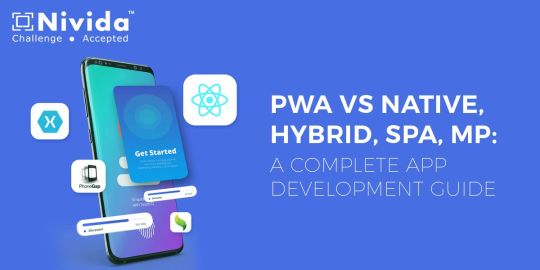
Progressive Web Apps (PWAs):
PWAs are web applications that are designed to look and function like native mobile apps. They are built using web technologies such as HTML, CSS, and JavaScript and are accessible through a web browser. PWAs are highly responsive, installable, and can work offline, making them an excellent choice for businesses looking to reach a wider audience across multiple platforms. Additionally, PWAs can be easily updated without requiring users to download new versions.
Native Apps:
Native apps are developed for specific platforms like iOS or Android using platform-specific languages (Swift or Objective-C for iOS, Java or Kotlin for Android). They offer the best performance, user experience, and access to device-specific features like camera, GPS, and push notifications. However, developing native apps requires separate codebases for different platforms, resulting in higher development costs and longer development cycles.
Hybrid Apps:
Hybrid apps are a combination of web and native apps. They are built using web technologies like HTML, CSS, and JavaScript and are wrapped in a native shell that enables them to be distributed through app stores. Hybrid apps provide a balance between cost-effectiveness and access to native features. However, they may not deliver the same performance as native apps, and certain device-specific functionalities might be limited.
Single-Page Applications (SPAs):
SPAs are web applications that load a single HTML page and dynamically update the content as users interact with the app. They offer a seamless user experience similar to native apps and can be accessed through web browsers. SPAs are easier to develop and maintain compared to native apps, but they may not provide the same level of performance and access to device features.
Multi-Platform Apps (MP):
Multi-platform apps are developed using cross-platform frameworks like React Native, Flutter, or Xamarin. These frameworks allow developers to write code once and deploy it across multiple platforms, saving time and effort. Multi-platform apps can achieve near-native performance and provide access to device features, making them a popular choice for businesses targeting multiple platforms.
When considering app development companies in India or Gujarat, it's essential to find a partner that understands your specific requirements and has expertise in the chosen development approach. Android App development companies in India and Gujarat offer a wide range of services, including native app development, hybrid app development, and PWA development. Similarly, Mobile App development companies in India and Gujarat can provide expertise in developing SPAs and MP apps.
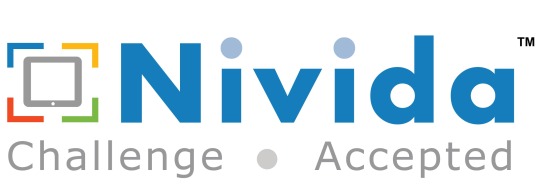
Before choosing an app development approach, consider factors such as budget, target audience, performance requirements, and time-to-market. Each approach has its own pros and cons, and the decision should align with your business goals and objectives. Consulting with a reputable app development company, Nivida Web Solutions Private Limited can help you navigate through these choices and make the right decision for your business.
In conclusion, the choice between PWAs, Native apps, Hybrid apps, SPAs, and MP apps depends on various factors such as performance, cost, development time, and target audience. Each approach has its own merits, and it's important to evaluate them based on your specific needs when selecting an app development company in India.
#eCommerce development company in India#eCommerce development Companies in Gujarat#Mobile App development Companies in India#Mobile App development company in Gujarat#Android App development Companies in India#Android App development company in Gujarat#Digital Marketing company in India
6 notes
·
View notes
Text
Ready to Build a Killer App? INTELLI Digital Has You Covered.
At INTELLI Digital, we don’t just develop mobile apps—we bring digital visions to life. Whether you're launching a startup or expanding your brand, we turn your ideas into sleek, powerful apps that users actually want to use.

So, how do we do it?
✅ We start with strategy. Every successful app begins with a smart plan. We dive deep into your goals, user behavior, and market trends to design a product that fits perfectly.
🎨 Then comes design. Our UX/UI experts craft clean, intuitive interfaces that look amazing and feel effortless. It's all about creating an experience your users love at first tap.
💻 Development? Agile all the way. We use the latest tech—Swift, Kotlin, Flutter, and React Native—to build fast, responsive apps for iOS and Android. Plus, we test early and often, so bugs don’t stand a chance.
📈 Post-launch, we don’t disappear. We monitor, maintain, and optimize your app so it keeps performing at its best as your audience grows.
From MVPs to enterprise-grade solutions, INTELLI Digital is your partner in mobile innovation. We bring together business brains, creative flair, and rock-solid coding to build something awesome—with you.
🔗 Got an app idea? Let’s make it real: intellidigital.com
#AppDevelopment#MobileAppDesign#INTELLIDigital#UXUI#ReactNative#Flutter#iOSDev#AndroidDev#DigitalInnovation#BuildBetterApps
0 notes